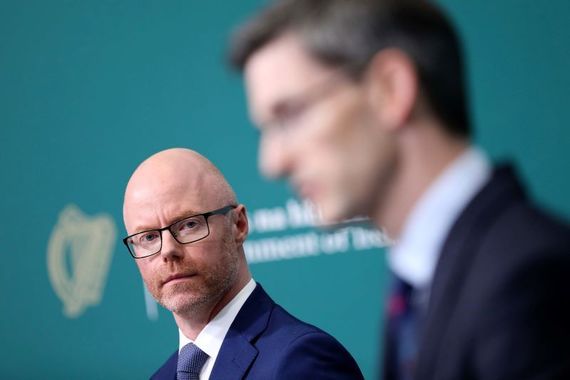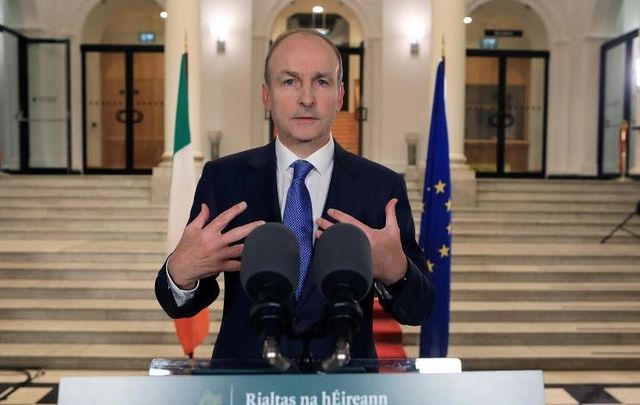As people here watched with horrified fascination the drama of President Trump's helicopter transfer to hospital, few of us expected that we were about to be plunged into a COVID drama of our own last week.
*Editor's Note: This column first appeared in the October 7 edition of the Irish Voice newspaper, sister publication to IrishCentral.
This came without warning on Sunday night with the news that the National Public Health Emergency Team (NPHET, the panel of medical experts that advises the government) was recommending that the entire country should immediately be put on full lockdown.
NPHET had been so alarmed by the surge in cases last week that it held an emergency meeting on Sunday, after which it sent a recommendation to the government that a total national lockdown for four weeks should be implemented to stop the accelerating rise of the virus.
A month or so ago we were seeing 30 or 40 new cases a day. In the last week or two, this increased to 300 or 400 cases a day.
On Saturday, there were 613 cases followed by 364 on Sunday, giving almost 1,000 new cases over the weekend. And on Monday, there were 518 new cases.
One of the most important figures monitored by NPHET is the five-day average number of cases. A month ago that was below 100. By the end of last week, it was 463. And the growth in cases has now spread across the country and across all age groups, which is particularly worrying.
We have seen spikes here before, due to outbreaks in meat plants for example, but the relentless, widespread growth in cases in the past two weeks alarmed the NPHET experts. By last weekend, medics and scientists involved in the battle here were warning that there could be up to 1,000 new cases a day within a week and double that before the end of this month if sharp corrective action is not taken.
Dr. Tony Holohan.
And so, after an emergency meeting on Sunday, NPHET sent a letter to the government calling for an immediate national lockdown. It's worth remembering what that means -- staying at home, no visitors, no socializing, leaving home only for essential reasons like shopping for food or medicine, all other stores closed, bars and restaurants closed apart from takeaway, public transport only for essential workers, everyone else to work from home, etc.
In recent weeks, we had lulled ourselves into the feeling that things were going to be okay here and we would get through this. So the sudden announcement on Sunday night that we were facing a total nationwide lockdown was a real shock.
And it was not just the population that was shocked. The government was shocked as well, and angry that the news had become public before it had been informed.
The next day, Monday, the three party leaders in the government met the top NPHET members, and after a discussion that lasted several hours, followed by a Cabinet meeting, it was decided that for the first time since this crisis began the government would not follow the advice of its expert medical team. Instead of implementing a national lockdown, a widening of the existing level of restrictions is to be used instead.
As you may know, the government here is operating a five-level plan of restrictions to fight the virus with the level increased to match increases in case numbers. Since the situation improved a few weeks back, most of the country has been on Level Two, apart from Dublin and Donegal which were put on Level Three recently.
In response to the NPHET warnings last weekend, the government has now decided to put the whole country on Level Three, with some additional measures. It's not a national lockdown, but even this level of restrictions is quite demanding. Social gatherings are not allowed, for example, and people are expected to remain within their own county.

Ireland's Minister for Health, Stephen Donnelly.
The big question is whether this will be enough to get the virus here under control again. No one knows the answer to that and much will depend on how meticulous people are in obeying the rules.
The problem is not just students going back to college and having house parties, which made headlines recently. It has been noticeable in recent weeks that people, in general, have become much more relaxed when meeting for coffee, lining up in supermarkets, and so on. Mask wearing and social distancing are usually observed, but it's become hit and miss, and the attitude is casual.
It is this fatigue and boredom that has fed the recent dramatic rise in case numbers, most of which have been community-based (cases in which the exact origin of infection cannot be identified). If nothing else, the weekend threat of total national lockdown may scare people into being more attentive to their behavior.
For the government, this is a decision that is fraught with danger. If the population now gets the message and changes behavior, the virus may be contained and we will be back on a stable track again while we wait for a vaccine.
If that does not happen, however, there is a real danger of exponential growth in case numbers, followed by a sharp rise in hospital admissions and patients needing ICU beds.
Indeed, it was that scenario that may have pushed NPHET into calling for a full lockdown at this stage. We have a serious shortage of ICU beds in relation to our population size.
Several experts have pointed out that the present rate of increase in cases means we would run out of ICU beds by the middle of next month and would be facing the kind of grim scenes we saw in Italy at the height of the crisis there. And if that happens, it will be the government which will get the blame thanks to the weekend decision, not NPHET.
The short, sharp shock approach to getting the virus under control with a full but temporary lockdown -- also called a virus circuit breaker -- has been used in other countries and major cities with some success. From NPHET's point of view, this sort of pre-emptive strike makes sense. But the medical experts can focus entirely on what it takes to beat the virus.
It's not that easy for governments, either here or anywhere else, which have to take a wider view. It's a question of balancing lives and livelihoods.
A total lockdown here, even for four weeks, would put hundreds of thousands of people out of work again. The economic damage going forward would be even worse than it already is, with all the human misery that would bring.
On one side, the argument is that the human cost of total lockdown, in depression, despair, suicides, etc., is too high. On the other side, the argument is that if we fail to keep the virus under control there will be deaths and economic collapse anyway, with all the consequences in human suffering that will bring. Finding the right path to follow is far from easy.
We should know whether the government has taken the right decision within weeks. In that time we need to do a lot of other things as well, like introducing temperature testing at airports. At present, we have the ridiculous situation in which we are telling people not to travel outside their own county but there are no restrictions on people traveling into the country.
If all goes well, we may get back to a manageable level of virus spread here. If not, we could yet see a reversal by the government and a full national lockdown in a few weeks.




Comments